Stand Up for Homeowners’ Rights
The Ojai Valley Sanitary District (OVSD) is illegally charging homeowners high capacity fees for Accessory Dwelling Units (ADUs), violating California state law (Government Code Section 65852.2). These fees, imposed without proper justification, create financial burdens and delays for homeowners, hindering much-needed housing development. Despite clear legal violations, the Housing and Community Development (HCD) department has failed to take action, leaving homeowners without a solution.
Unfair ADU Fees
Homeowners are facing illegal fees. These unjust charges create financial burdens and hinder housing solutions in our community.
Capacity fees are charges imposed by public utility districts to cover the cost of infrastructure needed to support additional demand on services like water and sewer systems. These fees are typically applied when new construction or significant modifications to existing properties (such as adding an Accessory Dwelling Unit, or ADU) increase the need for utility capacity. Essentially, they are meant to ensure that the public utility can handle the extra load brought on by new connections or expansions.
When are Capacity Fees Usually Applied?
*Direct Connection to the Utility: Normally, capacity fees are charged when a property or new unit makes a direct connection to a utility’s main infrastructure, such as the main sewer or water line. The rationale is that the new connection places a tangible strain on the system, and the fees are used to fund necessary upgrades to support that demand.
*Infrastructure Expansion: If a new development requires the expansion of public infrastructure, like new sewer lines or increased water treatment capabilities, capacity fees help cover these costs. This ensures that the system can continue to serve all customers, including the new connections, without overloading.
However, in the case of Accessory Dwelling Units (ADUs), the situation is different. Many ADUs are connected indirectly through the main home’s existing utility connection. According to California law (Government Code Section 65852.2), capacity fees should not be charged unless the ADU requires a direct connection to the utility infrastructure. Despite this, OVSD has been charging illegal capacity fees to ADU owners even when there is no direct connection, violating state law and creating financial burdens for homeowners.
Several legal principles and codes address the concept of prepaid inherent capacity in existing infrastructure, particularly when the infrastructure is not owned by the utility but was built and paid for with initial capacity fees. These principles align with the reasoning that fees should not be imposed when existing infrastructure can accommodate additional usage without exceeding its design capacity. Here are the relevant laws and arguments:
1. Government Code § 66013 – Capacity Fees Nexus
This code mandates a nexus between capacity fees and the costs incurred to provide additional capacity. If the built-in capacity of existing laterals or infrastructure has already been paid for, adding additional Drainage Fixture Units (DFUs) without exceeding its capacity does not justify imposing new capacity fees.
Key Clause:
“(b) A fee for capacity shall not exceed the estimated reasonable cost of providing the service for which the fee is charged.”
Application:
If the capacity of a lateral has already been paid for and is not exceeded by the addition of new DFUs, imposing a new capacity fee violates this principle. No new service or capacity is being provided.
2. Proposition 218 – Proportionality Requirement
Key Clause:
Under Proposition 218, any fee must be proportional to the cost of the service provided. When no additional capacity is required, a capacity fee is disproportionate and invalid.
“Revenues derived from the fee or charge shall not exceed the funds required to provide the property-related service.”
Application:
If the infrastructure’s inherent capacity can accommodate the new DFUs without further modifications or service expansions, a capacity fee would exceed the cost of providing service, violating Proposition 218.
3. Public Utilities Code § 1501 et seq. – Fairness and Reasonableness
This code requires that public utilities ensure rates and charges are fair and reasonable. Charging capacity fees for pre-existing infrastructure that has sufficient paid-for capacity may constitute an unreasonable charge.
Key Principle:
“Charges must be based on the cost of the service provided.”
Application:
If the utility is charging fees unrelated to actual costs incurred due to the addition of DFUs, this could be challenged as unfair and unreasonable.
4. Case Law: Nollan/Dolan Takings Clause Precedents
The Takings Clause requires that exactions, including capacity fees, have a clear nexus and proportionality to the impact of the project. If a property owner can demonstrate that the DFUs fall within the existing infrastructure’s inherent capacity, there is no nexus or proportionality to justify new capacity fees.
Relevant Precedent:
“An exaction must be related in nature and extent to the impact of the proposed development.” (Dolan v. City of Tigard, 512 U.S. 374, 1994)
Application:
Charging capacity fees when the existing lateral has sufficient inherent capacity would fail the proportionality test.
5. Government Code § 66016 – Fee Justification and Transparency
This section requires agencies to justify fees with detailed data on how the fees are calculated and the costs they are intended to recover. If the lateral’s inherent capacity is already paid for, the utility cannot justify a new capacity fee without proving additional capacity is required.
Key Clause:
“Any action adopting or increasing a fee shall include the evidence necessary to demonstrate that the fee does not exceed the estimated reasonable cost.”
Application:
When no additional capacity is required, this justification cannot be met, and the fee is invalid.
6. California Government Code § 65008 – Equal Treatment and Non-Discrimination
This code ensures that fees and charges are applied fairly and equally among property owners. If other property owners with similar laterals are not charged capacity fees when adding DFUs, but you are, this constitutes unequal treatment.
7. Historical Capacity Fee Prepayment
Many utilities use capacity fees to fund initial infrastructure construction and reserve future capacity for property owners. When these fees were paid at the time of development, they inherently covered the capacity of the laterals installed.
Legal Argument:
“Imposing additional fees for the same infrastructure capacity that has already been prepaid constitutes double charging and violates the purpose of capacity fees.”
Legal Violations by OVSD Related to Capacity Fees
The Ojai Valley Sanitary District (OVSD) is imposing capacity fees on homeowners who build Accessory Dwelling Units (ADUs), even when these units are indirectly connected to the main sewer line through the primary residence. This practice violates California Government Code Section 65852.2, which sets clear guidelines for when local agencies can charge capacity fees to ADU owners.
What the Law Says:
California Government Code Section 65852.2 outlines the conditions under which local agencies may impose fees on ADU developments.
(2) An accessory dwelling unit shall not be considered by a local agency, special district, or water corporation to be a new residential use for purposes of calculating connection fees or capacity charges for utilities, including water and sewer service, unless the accessory dwelling unit was constructed with a new single-family dwelling.
(4) For an accessory dwelling unit described in subparagraph (A) of paragraph (1) of subdivision (e), a local agency, special district, or water corporation shall not require the applicant to install a new or separate utility connection directly between the accessory dwelling unit and the utility or impose a related connection fee or capacity charge, unless the accessory dwelling unit was constructed with a new single-family dwelling.
(5) For an accessory dwelling unit that is not described in subparagraph (A) of paragraph (1) of subdivision (e), a local agency, special district, or water corporation may require a new or separate utility connection directly between the accessory dwelling unit and the utility. Consistent with Section 66013, the connection may be subject to a connection fee or capacity charge that shall be proportionate to the burden of the proposed accessory dwelling unit, based upon either its square feet or the number of its drainage fixture unit (DFU) values, as defined in the Uniform Plumbing Code adopted and published by the International Association of Plumbing and Mechanical Officials, upon the water or sewer system. This fee or charge shall not exceed the reasonable cost of providing this service.
Subsection (f)(2)(A) specifically states that local agencies cannot charge capacity fees or other development impact fees for an ADU unless the ADU creates a direct connection to the utility (e.g., sewer or water main).
If the ADU does not directly connect to the utility but instead connects through the primary residence’s existing connection, capacity fees should not be applied.
How OVSD is Violating the Law:
Despite the clear language of Section 65852.2, OVSD has been imposing capacity fees on homeowners for ADUs that do not require a direct connection to the sewer main. These fees can range up to $16,000 per ADU, creating an undue financial burden on homeowners who are simply following the law by indirectly connecting their ADU to their primary residence’s sewer line.
No Justification for Fees: OVSD’s capacity fees are applied even though these ADUs do not increase the demand on OVSD’s sewer system in a way that justifies these charges. The ADUs rely on the main residence’s existing sewer connection, meaning there is no additional load requiring system expansion or significant infrastructure upgrades.
Retroactive Fees: OVSD has even applied these fees retroactively, charging a homeowner after their ADUs have already been built, connected and inspected. This practice is not only illegal under state law but also lacks proper notice and due process, further violating homeowners’ rights.
Government Code Section 65852.2(f):
This section is meant to protect homeowners from excessive fees and facilitate the construction of affordable ADUs, which are critical to addressing California’s housing crisis. OVSD’s actions directly contradict the state’s intent and create unnecessary financial barriers for homeowners seeking to add much-needed housing units.
Conclusion:
OVSD’s imposition of capacity fees on ADUs that are indirectly connected to the main sewer line is in direct violation of California Government Code Section 65852.2. This unlawful practice is not only financially harmful to homeowners but also undermines the state’s efforts to promote ADU construction as a solution to the housing crisis. Homeowners are entitled to fight these illegal charges and seek relief under the law.

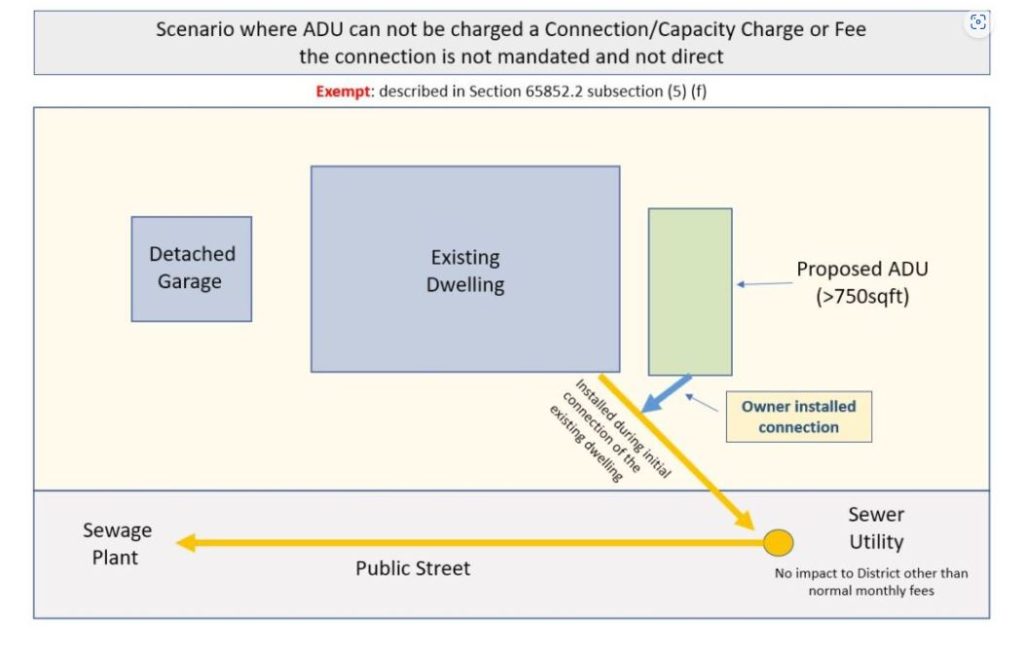
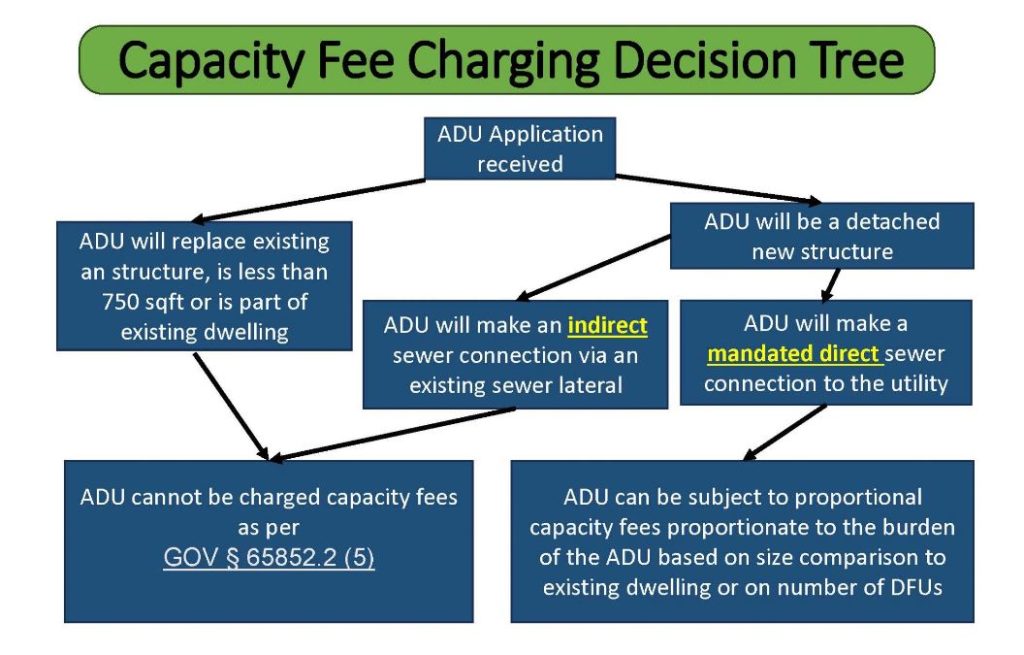
The illegal capacity fees imposed by the Ojai Valley Sanitary District (OVSD) are having a significant and far-reaching impact on homeowners who are building Accessory Dwelling Units (ADUs). These fees, which can range up to $16,000 per ADU, are creating serious financial burdens and are hindering the development of much-needed housing solutions.
1. Financial Burden on Homeowners:
The unexpected and exorbitant fees are causing severe financial strain on homeowners. Many who planned to build ADUs as a cost-effective way to create additional housing units are suddenly faced with unplanned, retroactive charges. This can lead to:
- Increased Project Costs: Homeowners are forced to absorb thousands of dollars in fees, which inflates the total cost of their ADU projects.
- Delayed or Canceled Projects: For some, the sudden imposition of these fees makes it financially impossible to complete their ADU projects. This delays the availability of housing units and forces some homeowners to abandon their projects altogether.
- Impact on Financing: Homeowners often take out loans or use their savings to fund ADU projects. The unexpected capacity fees can disrupt their financing plans, causing complications in loan repayments or forcing them to take on additional debt.
2. Delays in Project Completion:
The capacity fees are also causing substantial delays in the construction and completion of ADUs. For many homeowners:
- Post-Completion Fees: In some cases, OVSD is charging capacity fees after ADUs have already been built and connected to the primary residence’s utility lines. This post-completion fee imposition creates confusion and delays the final approval and issuance of occupancy permits.
- Legal Battles: Homeowners who contest these illegal fees often find themselves entangled in legal disputes, delaying the completion and use of their ADUs.
- Project Stalling: Some homeowners are forced to put their projects on hold while they gather the funds to pay the capacity fees or seek legal remedies to challenge them.
3. Discouraging Housing Development:
The ADU initiative is a critical component of California’s efforts to address the housing crisis. By making it more expensive and difficult to build ADUs, OVSD’s illegal fees are directly undermining this goal. Homeowners who would otherwise contribute to the solution by creating affordable housing units are deterred by the financial and logistical hurdles imposed by these illegal charges.
In summary, OVSD’s illegal capacity fees are creating unnecessary financial hardships for homeowners and delaying or even preventing the construction of ADUs. These actions not only impact individual homeowners but also undermine broader efforts to address the state’s housing shortage by discouraging the development of affordable and accessible housing options.
The California Department of Housing and Community Development (HCD) plays a crucial role in overseeing the enforcement of laws related to Accessory Dwelling Units (ADUs), particularly to ensure that local agencies comply with state mandates aimed at promoting affordable housing. However, in the case of the Ojai Valley Sanitary District (OVSD) and its illegal capacity fees, the HCD has largely been inactive, leaving homeowners without clear recourse to challenge these unlawful charges.
1. HCD’s Authority Under ADU Law:
The HCD is tasked with ensuring that local municipalities and utility districts follow the guidelines set forth by state laws, including Government Code Section 65852.2. These laws are designed to make it easier and more affordable for homeowners to build ADUs by limiting the fees and regulations local agencies can impose.
- Government Code Section 65852.2(f) specifically limits the fees that local agencies, like OVSD, can charge for ADUs, stating that capacity fees can only be charged if an ADU is making a direct connection to the main utility infrastructure. Despite this, OVSD has been charging fees for ADUs that only make indirect connections through the primary residence.
2. Inaction by HCD:
Despite its responsibility to ensure compliance with ADU laws, the HCD has not taken significant action against OVSD for imposing these illegal capacity fees. Homeowners who have reached out to the HCD to report these violations have encountered:
- Lack of Enforcement: Although HCD is aware of OVSD’s illegal practices, it has not enforced the law or intervened in a meaningful way to stop OVSD from charging these unlawful fees..
- No Clear Resolution: Homeowners are left with limited options to challenge OVSD’s actions because the HCD has not taken steps to provide oversight or legal support in addressing these violations. The absence of enforcement leaves homeowners vulnerable to continued exploitation.
3. Failure to Uphold ADU Law’s Intent:
The primary goal of California’s ADU laws is to reduce barriers to affordable housing and encourage the development of ADUs as a solution to the state’s housing crisis. By not enforcing the law against OVSD, the HCD is allowing a local agency to undermine this goal. OVSD’s illegal fees directly contradict the state’s intent to.
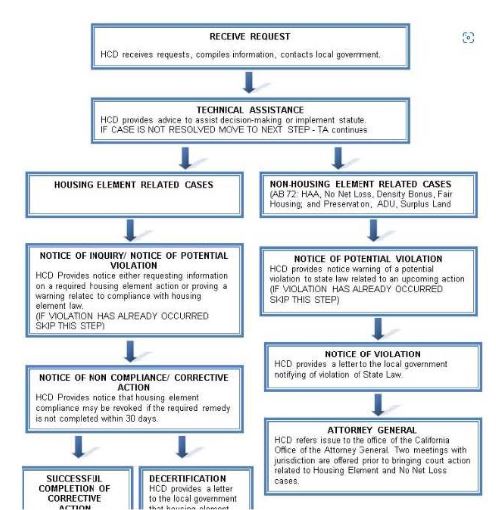
- Lower Costs for Homeowners: The law explicitly seeks to lower or eliminate unnecessary fees for ADUs to encourage more homeowners to build these units.
- Streamline ADU Development: The HCD’s inaction is contributing to project delays, increased costs, and discouraged ADU development, which runs counter to the state’s objective of addressing the housing shortage.
Conclusion:
The HCD’s inaction in the face of OVSD’s illegal capacity fees is a major obstacle to the enforcement of California’s ADU laws. By failing to take meaningful action, the HCD is allowing OVSD to impose unlawful fees that burden homeowners and discourage ADU development. Homeowners and advocates must continue to press the HCD to fulfill its responsibility in enforcing the law and protecting homeowners from illegal charges.
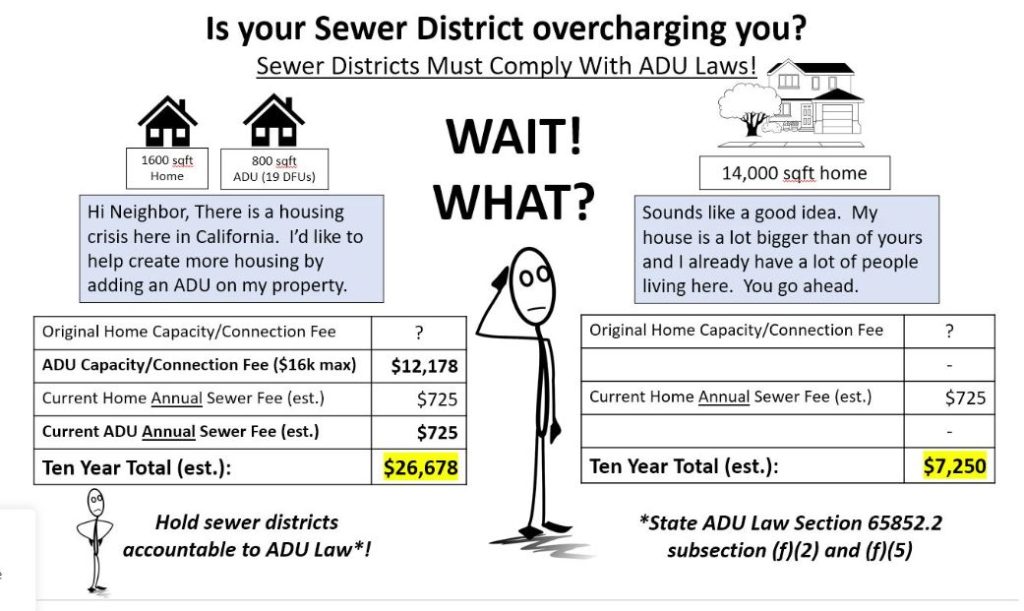
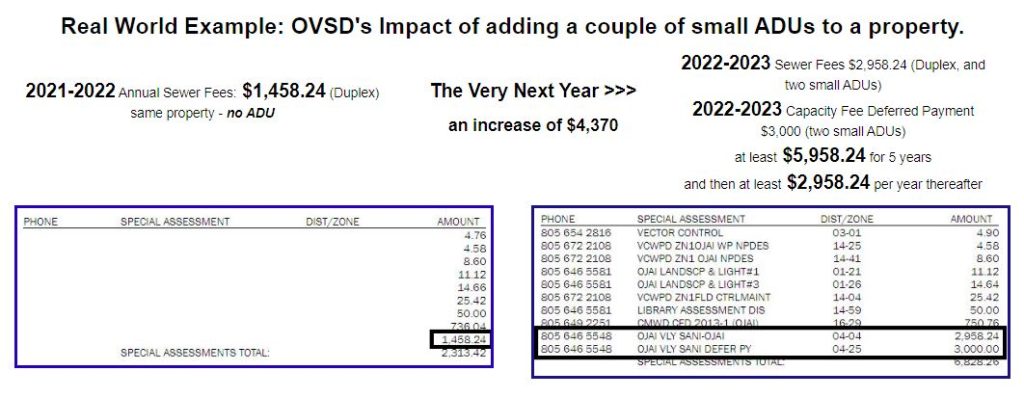
The fight against the Ojai Valley Sanitary District’s (OVSD) illegal capacity fees is crucial not only for homeowners affected by these charges but also for everyone who believes in fair housing practices and the enforcement of the law. Here’s how you can get involved and make a difference.
1. Join the ADU Rights Coalition:
- Sign Up for Updates: Stay informed by joining our mailing list to receive updates on legal proceedings, community actions, and ways to get involved.
2. Sign the Petition:
- Support Our Petition: We are gathering signatures to present to local and state officials, including the Housing and Community Development (HCD), to demand enforcement of ADU laws and an end to OVSD’s unlawful practices. Every signature counts in putting pressure on the authorities to act. (https://change.org/ADU-Rights)
- Share the Petition: After signing, share it with your network. The more people who are aware of and supporting the cause, the stronger our collective voice will be. (https://change.org/ADU-Rights)
3. Write to Your Local Representatives:
The primary goal of California’s ADU laws is to reduce barriers to affordable housing and encourage the development of ADUs as a solution to the state’s housing crisis. By not enforcing the law against OVSD, the HCD is allowing a local agency to undermine this goal. OVSD’s illegal fees directly contradict the state’s intent to.
- Contact Elected Officials: Reach out to your local and state representatives to inform them about OVSD’s illegal fees and the Housing and Community Development’s (HCD) inaction. Use our pre-written letter templates to make it easy to voice your concerns.
- Raise Awareness: Encourage your friends, family, and community members to contact their representatives as well. The more officials hear about this issue, the harder it will be for them to ignore it.
4. Attend Community Meetings and Hearings:
- Participate in OVSD and HCD Meetings: Attend local board meetings and hearings to make your voice heard. Public comment periods are a vital way to ensure that your concerns are on record.
- Join Us at Town Halls: We regularly participate in community town halls and housing discussions. Join us to share your story, learn about the latest developments, and contribute to the fight for fair treatment of homeowners.
5. Share Your Story:
- Submit Your Experience: If you have been affected by OVSD’s illegal capacity fees, share your story with us. Your personal experience can help highlight the widespread impact of these practices and inspire others to take action.
- Become a Voice for Change: Help us raise awareness by sharing your experience on social media, local news outlets, or through community networks. The more visibility we generate, the more pressure we can place on OVSD and the HCD.
Conclusion:
Seeking Allies to Resolve OVSD’s Illegal Fees on ADUs:
We are reaching out to individuals who may have connections or ideas to help us resolve a critical issue affecting homeowners in our community. The Ojai Valley Sanitary District (OVSD) is unlawfully charging capacity fees to homeowners for their Accessory Dwelling Units (ADUs), despite these fees being in clear violation of state law (Government Code Section 65852.2). This issue has burdened many with thousands of dollars in unjust fees, delayed housing projects, and created financial hardship.
If you or someone you know has connections or expertise that could help, We’d love to hear from you. Specifically, we are seeking:
- Attorneys who might be interested in helping us challenge these illegal fees in court.
- People with strong relationships with local or state representatives, who could help us raise awareness and advocate for enforcement of the law.
- Journalists or connections in the media who can help expose this issue to a wider audience and investigate the impact of OVSD’s actions on homeowners.
There are many ways to take action and contribute to the fight against OVSD’s illegal fees. Whether you sign the petition, write to your representatives, or share your story, your involvement will help build a strong coalition to hold OVSD accountable and protect homeowners from unjust financial burdens. Together, we can make a difference.
Hidden Charges
Many homeowners are unaware of the unexpected fees linked to ADUs. This lack of transparency leads to financial strain and confusion when trying to comply with local regulations.
Legal Compliance
The OVSD’s fees often violate California laws, leaving homeowners at risk. Navigating these legalities can be complicated without proper guidance and resources.
Community Impact
Excessive fees discourage many from creating ADUs. This not only exacerbates housing shortages but also impacts community growth and diversity.
Limited Resources
Homeowners lack accessible legal resources to combat unfair charges. This creates a significant barrier to justice and homeowner empowerment within our community.
Our Journey Toward Justice
Join Us in the Fight Against Unjust Fees
OR Call Us At: